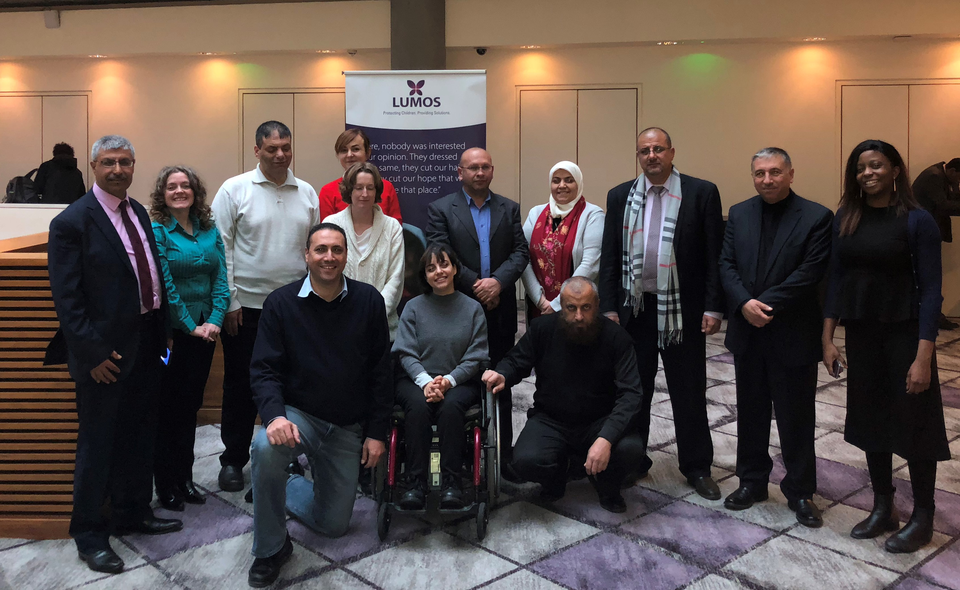“At the beginning of this conversation, I did not think deinstitutionalisation was possible in Jordan, and now, at the end of this conversation, I am convinced that it is.”
- His Royal Highness Prince Mired Raad Zeid Al-Hussein of Jordan

Pictured: members of the Ministry of Social Development and the Higher Council for the Rights of Persons with Disabilities (HCD), and members of Lumos
At Lumos, we see this change in mindset occur time and time again. We see champions in different countries with all the necessary will and an unflinching belief that their system must change, but who face resistance from all spheres to the process of deinstitutionalisation (DI). With time, they lose hope that reform is in fact possible, until they encounter someone who is able to reassure them that it is.
When we talk about deinstitutionalisation at Lumos, we are not only referring to the process of closing institutions and reuniting children with their families. We also work with professionals - such as doctors, nurses and teachers - and governments, to change a system that stigmatises children, particularly those with disabilities or from poor families. Crucially, we plan and help governments transfer resources, including personnel, budgets and material assets, from institutions to services that will support children and families in the community sustainably.
Over the past three years, Lumos has been providing advice and training to Jordan, specifically to the Higher Council for the Rights of Persons with Disabilities (HCD) – an independent public entity funded by State allocations and headed by His Royal Highness Prince Mired bin Raad Zeid Al-Hussein. The HCD was established to advocate for persons with disabilities and create transformative policies and plans. Due to the indisputable evidence on the harm caused by children being placed in institutions, the Higher Council for the Rights of Persons with Disabilities is determined to be the driving force behind deinstitutionalisation in the country.
Reform will not be straightforward nor will it be easy in Jordan. At present, there are 34 institutions – 5 Government-run institutions and 29 privately-run institutions – housing children, youth and adults with disabilities. Resistance will be widespread, particularly from those with vested interests in keeping the institutions open. Despite the availability of some statistics, to date there is no reliable information concerning the number of children and adults living in all Jordanian institutions or the quality of care they receive. Yet, we know that their basic rights are unequivocally being violated, including their rights to live with their family and their right to live and contribute to their community.
The good news is that Jordan is committed to transforming the system of care for children and adults with disabilities. During the last few years, the HCD has sought the advice of Lumos to undertake the necessary ground work for deinstitutionalisation in Jordan. Lumos’ technical support has ranged from providing practical training on the process, working with the HCD on the elements of a plan for transforming care, developing a roadmap for Jordan, and helping the HCD develop key evidence-based messages to manage the resistance to deinstitutionalisation.
In May 2017, after years of diligent advocacy by the HCD, the Jordanian Parliament approved a new law on the Rights of Persons with Disabilities, which includes an article specifically calling for the transition from institutions to community-based services. This law will enable children and adults with disabilities to live with their families and in their communities. The new law entered into force on 1st September 2017 and, as per the law, Jordan must have a national 10-year DI Action Plan ready for implementation by September 2018. The HCD is now working tirelessly with the Jordanian Ministry of Social Development to make this happen.
Last week, key members of the Ministry of Social Development and the Higher Council travelled to London for a high-level study visit to learn about the community-based services available in the UK. They visited a number of services that support and empower children and adults with disabilities and their families, including day centres, inclusive education programmes in mainstream schools, in-home care provision, fostering and short-term breaks. The high-level visit – headed by His Royal Highness Prince Mired – also included two days of strategic planning with Lumos to begin drafting the 10-year national DI Action Plan.
With Lumos’ support and the recent approval of the law, the HCD will now begin carrying out the comprehensive plan for transforming the system of care and ending the institutionalisation of the most vulnerable children and adults in Jordan. The transformation process will not only impact the lives of some of the country’s most vulnerable, but will position Jordan as a regional champion, paving the way for other countries in the Middle East to follow.



